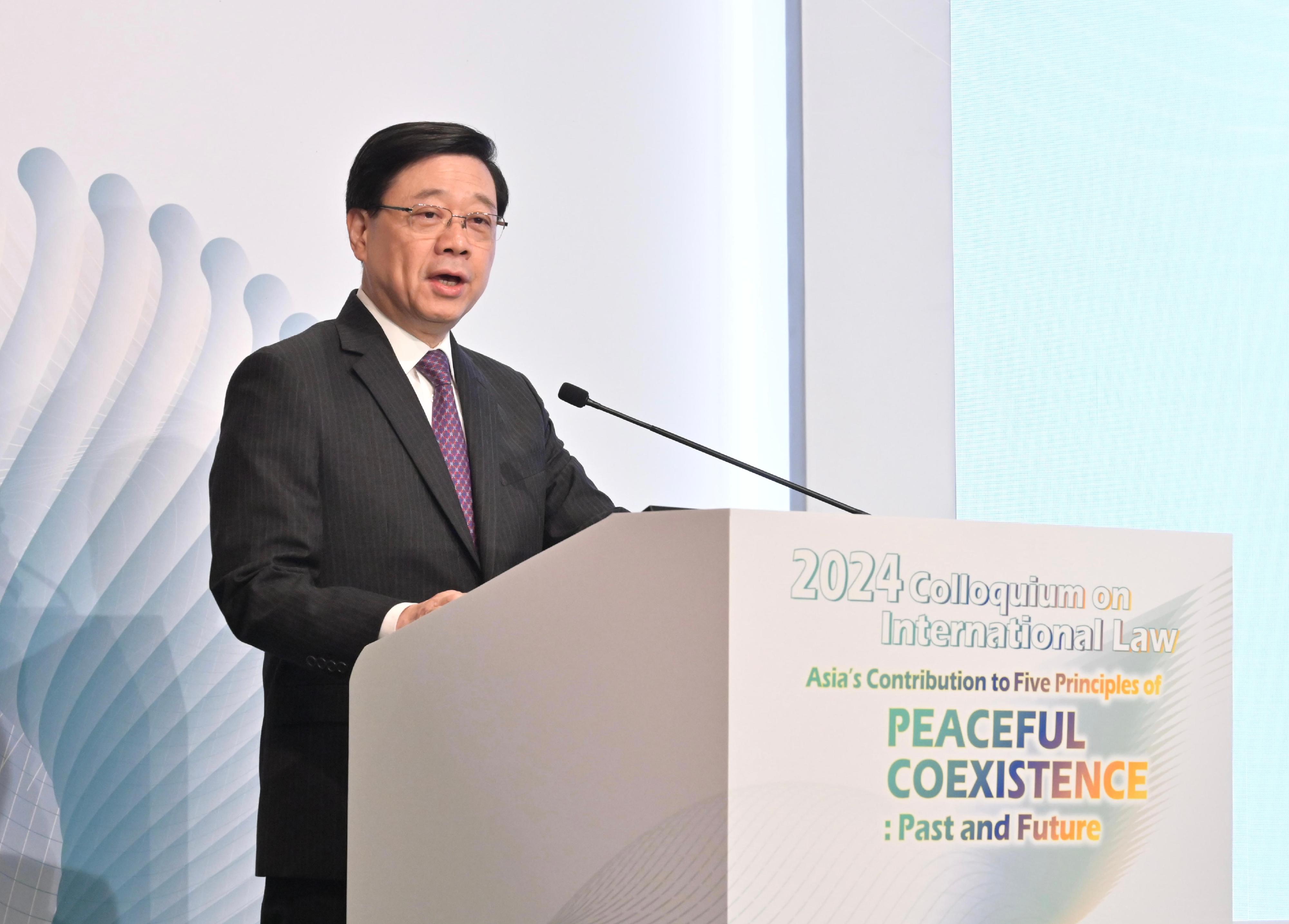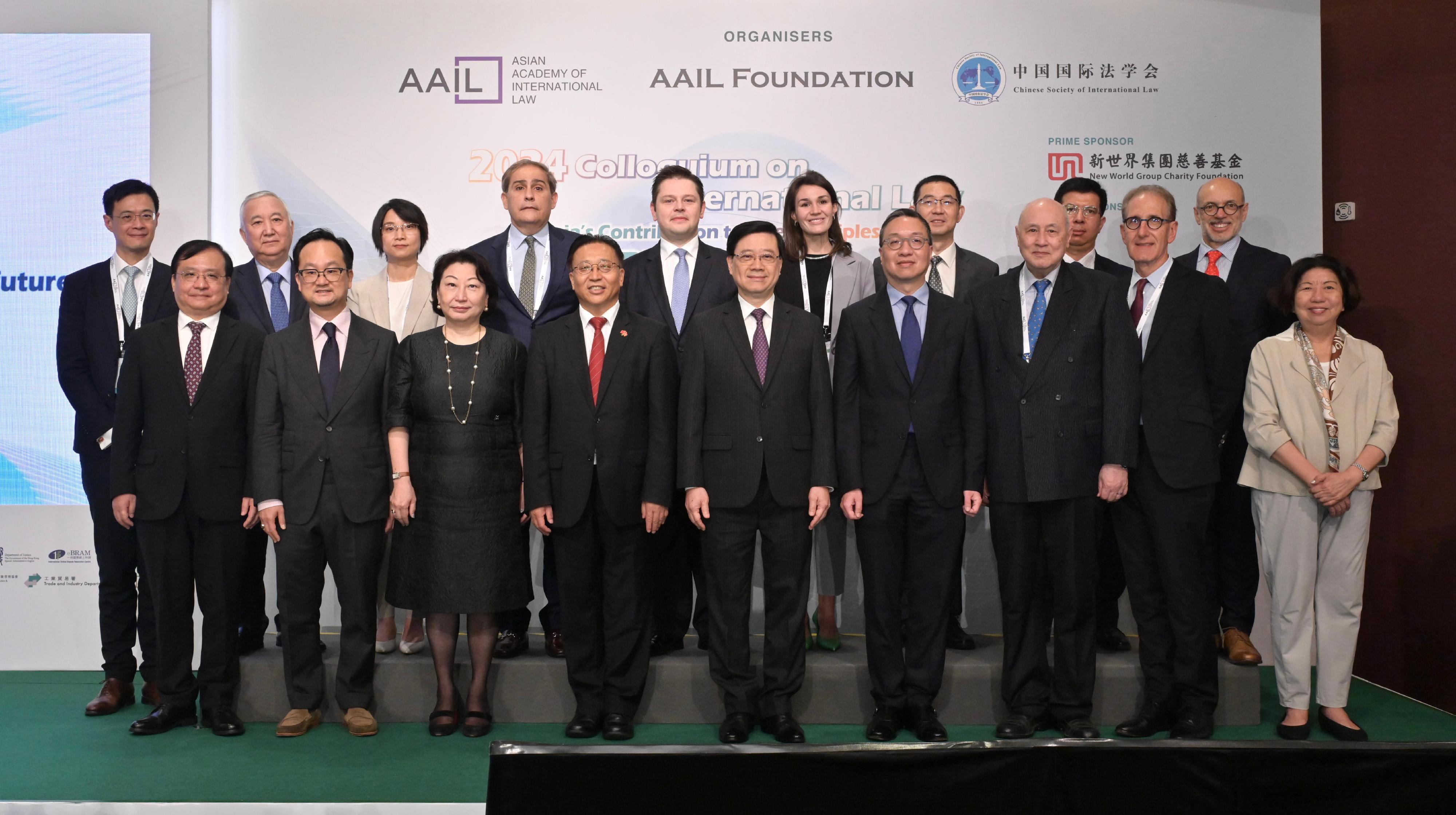Following is the speech by the Chief Executive, Mr John Lee, at the 2024 Colloquium on International Law today (July 5):
Commissioner Cui Jianchun (Commissioner of the Ministry of Foreign Affairs in the Hong Kong Special Administrative Region), Ms Teresa Cheng (Founder Member and Co-Chairman of the Asian Academy of International Law), Dr Anthony Neoh (Co-Chairman of the Asian Academy of International Law), Consuls General, ladies and gentlemen,
Good morning to you all. It's a pleasure to speak to you today, at the opening of the 2024 Colloquium on International Law.
My thanks to the Asian Academy of International Law (AAIL), the AAIL Foundation and the Chinese Society of International Law for organising this essential annual event, with its spotlight on international law issues and concerns amid the latest global developments.
The theme of this year's Colloquium is "Asia's Contribution to Five Principles of Peaceful Coexistence: Past and Future."
It's a timely focus, given that this year marks the 70th anniversary of their pronouncement.
The Five Principles are:
- Mutual respect for each other's territorial integrity and sovereignty;
- Mutual non-aggression;
- Mutual non-interference in each other's internal affairs;
- Equality and mutual benefit; and
- Peaceful coexistence.
The Principles are deeply rooted in Asian philosophy and culture, including such traditional Chinese beliefs as "peace is the most precious" 以和為貴, "peace among all nations" å�”å’Œè�¬é‚¦ and values such as love, kindness and peace – beliefs cherished by many Asian countries.
The universal recognition of the Five Principles is undeniable. Its underlying doctrine epitomises the purposes and principles of the United Nations Charter, which emphasises respect for sovereign equality, the prohibition of the threat or use of force and the essential importance of the peaceful settlement of disputes.
Although seven decades have passed since the Five Principles were announced, they are still very much present, and needed, in today's turbulent world.
As President Xi remarked, in Beijing, last week, at the Conference Marking the 70th Anniversary of the Five Principles, and I quote: "The Five Principles of Peaceful Coexistence have transcended time and space and overcome estrangement, showing robust resilience and everlasting relevance. They have become open, inclusive and universally applicable basic norms for international relations and fundamental principles of international law. They have made indelible historic contributions to the cause of human progress."
President Xi added that the Five Principles have also served as the prime guidance for the establishment and development of relations between countries with differing social systems, acted as a powerful rallying force behind the efforts of developing countries to pursue cooperation and self-strength through unity and contributed historic wisdom to the international order's reform and improvement.
Many Asian countries have contributed to the Five Principles, some through their participation in the Belt and Road Initiative, since building a community with a shared future aligns with the spirit of the Five Principles.
By removing barriers to trade and building a more interconnected world, Asian countries continue to fuel growth in the region, and well beyond.
China has an extensive trade network in Asia and throughout the world. Hong Kong, a Special Administrative Region of China and a founding member of the World Trade Organization, also plays an important role in international trade.
Thanks to "one country, two systems", Hong Kong, an international financial and legal hub, builds bridges and encourages open trade.
That begins with China, our country. CEPA – the Mainland and Hong Kong Closer Economic Partnership Arrangement. In the past 21 years, CEPA enabled Hong Kong companies and professionals to enjoy preferential treatment when doing business in the Mainland and reinforced Hong Kong's role as a bridge connecting the Mainland and the rest of the world. And there is much more to come.
Earlier this week, new amendments to CEPA's services trade were announced, following months of consultation. The sectors set to enjoy expanded trade liberalisation including legal and financial services, as well as testing and certification-related services, architectural services and more, tapping into the vast business opportunities brought about by the rapid development of the country as well as the national and international dual circulation strategy.
The agreement, largely concluded and soon to be finalised, means that, among other things, legal practitioners from Hong Kong will have greater room to do business in the Mainland. And that, ladies and gentlemen, can only accelerate Hong Kong's rise as a centre for international legal and dispute-resolution services in the Asia-Pacific region. Now that's a good-news story for our legal professionals and the sector in general.
My thanks to the Central Government for making it happen, for creating bountiful opportunity for Hong Kong – and all those who work with Hong Kong.
As an international legal-and-dispute-resolution services centre, Hong Kong contributes to the peaceful settlement of international disputes in support of the Five Principles.
With the support of the Central Government, Hong Kong has been chosen to host the headquarters for the International Organization for Mediation, which will further enhance Hong Kong's role as an international hub for dispute resolution in the Asia-Pacific region.
The use of mediation, which is deeply rooted in Asian cultures, reflects the spirit of the Five Principles. And the establishment of the headquarters for the International Organization for Mediation in Hong Kong can only contribute to the continuing reference, and relevance, of the Five Principles.
The advocacy of the Principles by Asia, and China in particular, which looks to them as guiding principles in its foreign policy, has contributed to the establishment of a new international political and economic order, one that is rational and beneficial to world peace and stability.
As President Xi noted at the conference in Beijing last week, when the Five Principles are followed, "even countries that differ from each other in social system, ideology, history, culture, faith, development stage and size can build a relationship of mutual trust, friendship and cooperation."
With its distinct and diverse cultural heritage, its economic dynamism and growing political influence, Asia is well-positioned to continue practicing the ideals enshrined in the Five Principles. In doing so, it can only extend the far-reaching benefits of peaceful coexistence to the rest of the world.
Hong Kong will continue to abide by the spirit of the Five Principles of Peaceful Coexistence through our support of the Belt and Road and other initiatives for greater regional integration. We will also continue to promote the peaceful resolution of disputes and encourage stronger capacity building in Asia and beyond.
Ladies and gentlemen, the enduring Five Principles of Peaceful Coexistence are words to live by in peace, harmony and mutual prosperity.
My thanks, again, to the organisers for bringing us together here, in person and online. I wish you all a rewarding day and the best of business, law and life in the coming year.
Thank you very much.
Follow this news feed: East Asia







